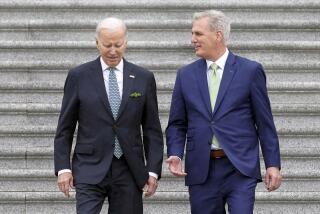Pakistan’s dicey deal
The Pakistani government’s announcement this week that it has cut a deal with Taliban leaders to trade peace for the imposition of Islamic law in the bucolic Swat Valley region is a worrisome development. The government appears to be ceding control over part of the North-West Frontier Province less than 100 miles from the capital of Islamabad. This would diminish the state’s authority and legitimize militants who have been torching girls schools, beheading police and assassinating civilian members of the ruling Awami National Party, driving out hundreds of thousands of terrified residents in a little more than a year.
On the militants’ side, the deal was crafted by Muslim cleric Maulana Sufi Mohammed, but the gunmen led by his more radical son-in-law have yet to sign on. Government officials argue that the accord will bring peace to the region without violating the constitution, which already requires that all laws comply with Islamic law, and that it will free up the military to focus on other areas, such as the contested region under tribal rule along the border with Afghanistan. Furthermore, they say it is a way to drive a wedge between the Taliban in Swat and groups in the tribal areas that also serve as sanctuary for the Taliban from Afghanistan and Al Qaeda.
In principle, the government is right to pursue negotiations with combatants and to distinguish between different insurgent groups. Unfortunately, the Pakistani government is negotiating from a position of weakness. The army lacks counterinsurgency capability and has not been able to beat back the Taliban’s Swat offensive, launched in November 2007. The provincial government is shaky and, therefore, lacks strong backing from a population trying to navigate between the warring sides. Rather than draw moderate insurgents away from their radical brethren and into the country’s established political system, this deal will allow the radicals to control Swat under a separate legal system, which threatens the integrity of the state. It does not demand that the militants disarm or formally denounce other insurgent groups, and it does not hold them accountable for the unlawful killings and other abuses
Meanwhile, there are many risks. The calm would allow the insurgents time to rearm and regroup. What happens if they start shooting again -- who will enforce the cease-fire? With U.S. air attacks putting pressure on the tribal areas and President Obama sending 17,000 more troops to Afghanistan, other insurgent groups could seek sanctuary in the newly quiet Swat region. Moreover, this deal sends a message to them that there’s no cost for serious human rights violations. Rather, they might keep fighting for a similar deal and control over more Pakistani territory.
More to Read
Sign up for Essential California
The most important California stories and recommendations in your inbox every morning.
You may occasionally receive promotional content from the Los Angeles Times.










